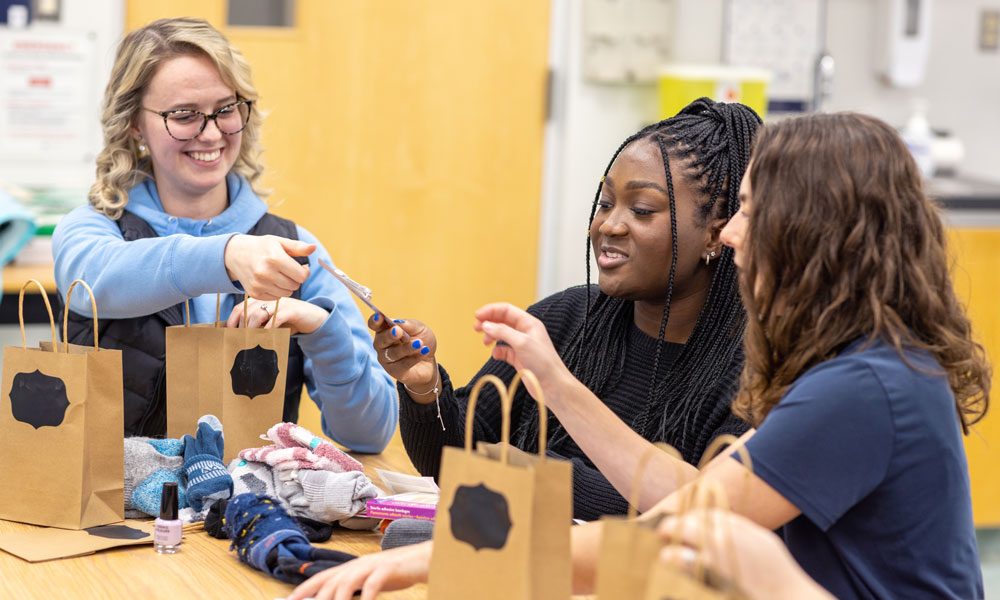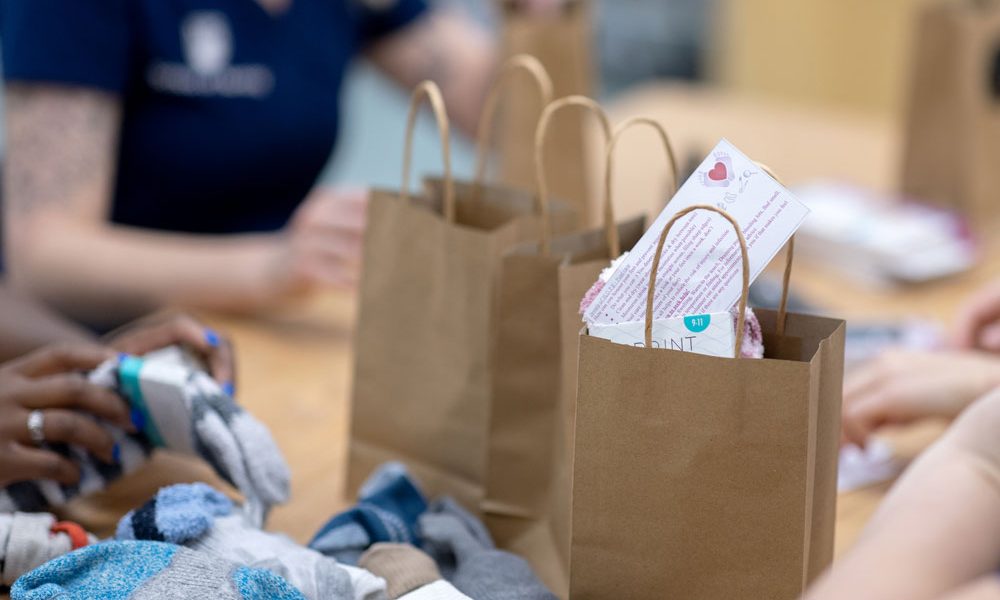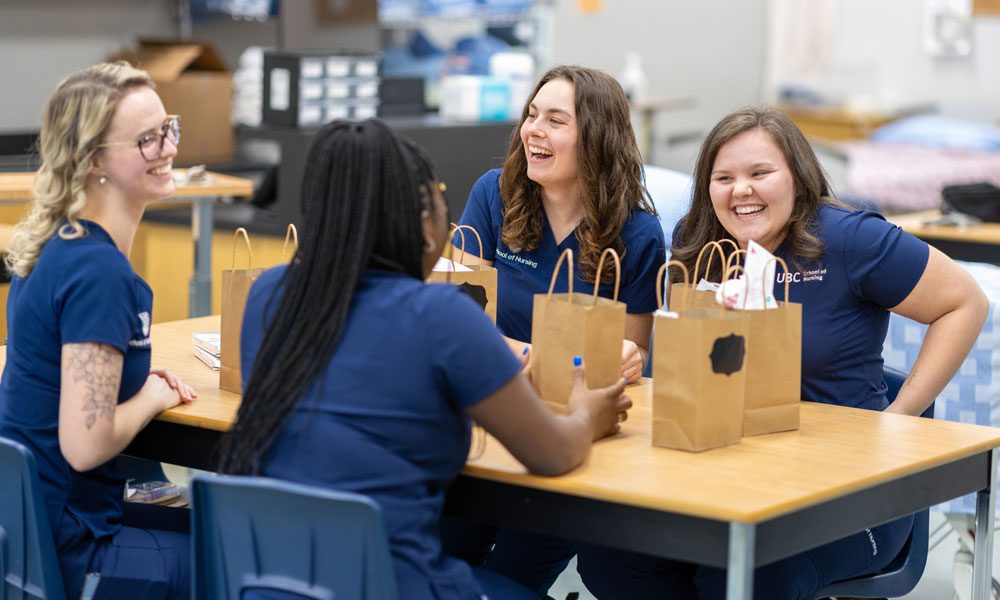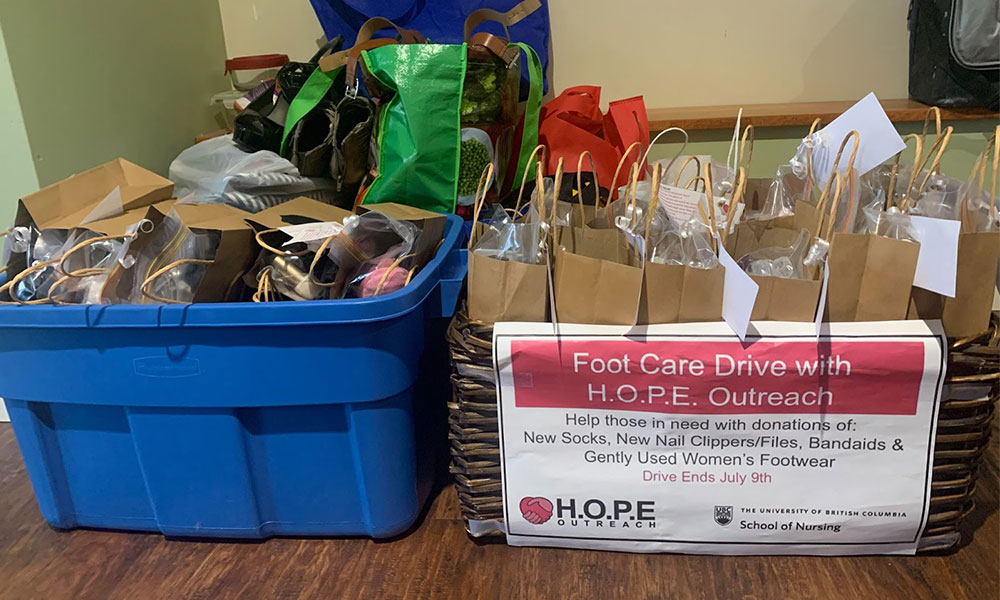
AS THEY CROUCH TOGETHER IN THE DARK OF THE NIGHT, the women tell similar stories of long days spent on their feet, walking from location to location with heavy belongings in tow. Wet and cold seep through ill-fitting shoes and worn socks, soaking their feet and making the day that much longer and harder.
Warm and healthy feet are usually a priority, but for unhoused women, immediate survival needs like food and shelter often take precedence. This lack of proper foot care can lead to unintended consequences, from infections and pain to mobility and balance issues.
Witnessing firsthand the challenges unhoused women face, a group of UBC Okanagan nursing students—in partnership with HOPE Outreach in Vernon and Kelowna—wanted to use their education and developing skill set to help inspire these women to develop a solution.
“Feet are our foundation,” explains Amy Huizinga, an undergraduate in UBC Okanagan’s School of Nursing. “Although a literature review told us that foot care was an issue with people experiencing homelessness, it wasn’t until we met these women on outreach shifts and really spoke to them about their experiences that we understood what a serious problem this is.”


Huizinga and her five classmates—Zola Penner, Susan-Grace Egege, Rochelle Obusan, Tamyra Grant and Izabelle Kneller—began working with HOPE as part of their fourth-year capstone project, which is intended to promote leadership skills in students through community partnerships.
“Hands-on experiences with community partners help our students develop and learn in diverse ways,” explains Sheila Epp, a registered nurse and instructor for the capstone course.
“From developing empathy and compassion for their clients to nurturing leadership and problem-solving, our students gain many skills that are important and necessary for nurses to have.”
In 2022, the BC Government added 602 new nursing seats, including seats at UBC Okanagan, to help meet the projected province-wide demand for nurses. As Epp points out, when preparing these nurses, in-community experiences are essential.
“Unless students really understand the population they’re working with, they can’t effectively offer the type of care they need to bring to the table.”
View this post on Instagram
She adds: “UBC Okanagan’s goal is to connect students with the community and to work with them to understand their needs. This challenges the students’ nursing skills, but at the same time emboldens them to collaborate and cooperate in ways they may not have considered.”
Drawing on the literature review and the information shared by women during their outreach shifts, the students decided that for their capstone project they wanted to empower unhoused women to take control of their health.
They organized a foot care drive, collecting commonly needed items like nail clippers, socks, band-aids and even shoes, and then preparing goody bags for a foot care education night.
“We collected items because it’s great for us to say, ‘you need to trim your nails a certain way to prevent ingrown toenails,’ but these women may not even have a pair of nail clippers,” explains Penner.
“By providing some of these tangible items to do the care routines we wanted to talk about, we hoped to create a welcoming environment that promotes positive, non-judgmental relationships between healthcare professionals and the homeless population.”

From left: Tamyra Grant, Susan-Grace Egege (back facing camera), Zola Penner and Amy Huizinga.
During one of HOPE Outreach’s Jewels of Hope nights—where vulnerable women in the Okanagan gather in a safe space to make jewellery—the nursing students led an interactive presentation for more than 20 attendees.
The students shared information about common foot conditions and preventative foot care; each attendee then received a goody bag, so that the women had the tools and education needed to better safeguard their feet.
“Everything these nursing students did was carried out with kindness and compassion—a true example of the Nurses Code,” explains Caitlyn Parkinson, Volunteer Coordinator for HOPE Outreach. “They not only taught women how to take care of their feet, but they also gave them the items to do that.
“It’s those little gestures that become rather large gestures, building trust and removing stigma.”

The impressive collection of donations the nursing students collected for HOPE Outreach.
She believes that such university-community partnerships are positive experiences for everyone involved. “Having these students work alongside us builds a sense of community and shows that we can all come together and support those in need. I also think students bring immense value with their knowledge, because they bring everything they’ve been learning to the table.”
As for the students and their experience working alongside HOPE Outreach, Tamyra Grant sums up the experience best:
“Leaving that education night, my heart was so full. It was amazing to make connections with the wonderful women and volunteers, and break down stigma, especially as future health-care workers.”
She adds: “It’s important for us to help foster trust in a community that may not have confidence in the health-care system. Trying to rebuild that a little bit, even through our simple interaction, has made a difference. It might allow someone to trust in the system enough to seek help when they need it, and for me, that’s a huge impact.”